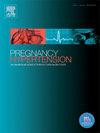小剂量阿司匹林停药时机与产后出血风险的关系
IF 2.9
4区 医学
Q2 OBSTETRICS & GYNECOLOGY
Pregnancy Hypertension-An International Journal of Womens Cardiovascular Health
Pub Date : 2025-08-12
DOI:10.1016/j.preghy.2025.101247
引用次数: 0
摘要
目的探讨低剂量阿司匹林(LDA)停药时机与产后出血(PPH)及出血相关并发症的关系。研究设计:在一家三级医疗中心进行了一项回顾性队列研究,研究对象是接受LDA治疗且分娩超过妊娠23周的孕妇。这些妇女在分娩前≤7天或≤7天停止服用LDA。排除标准为:严重胎儿畸形、宫内胎儿死亡、多胎妊娠、孕前使用LDA,以及缺少LDA停药时间的数据。主要结局指标:主要结局为复合出血结局,包括以下至少一项:PPH,出血量大于1000 ml,需要输血,分娩后血红蛋白下降≥4 g/dL。结果763例妇女中,192例(25.2%)在分娩≤7天停用LDA, 571例(74.8%)在分娩前7天停用LDA。比较这些组,PPH率、严重失血和输血需求没有显著差异,复合出血结局也没有显著差异(9.9%对8.6%,p = 0.661)。胎盘早剥在停止LDA≤7天的妇女中比在分娩前7天更频繁(5.2% vs. 1.1%, p = 0.002)。然而,在多变量分析中,LDA停药的时间与胎盘早剥风险的增加没有独立的相关性。结论停药时间与PPH升高及大出血并发症无关。本文章由计算机程序翻译,如有差异,请以英文原文为准。
The timing of discontinuation of low-dose aspirin and postpartum hemorrhage risk
Objectives
To evaluate associations of the timing of low-dose aspirin (LDA) discontinuation, with postpartum hemorrhage (PPH) and bleeding-related complications.
Study design
A retrospective cohort study was conducted at a tertiary medical center, of pregnant women who received LDA and delivered beyond 23 weeks of gestation. The women were categorized as having discontinued LDA ≤7 days or >7 days before delivery. Exclusion criteria were: severe fetal malformations, intrauterine fetal death, multiple pregnancy, pre-conceptional use of LDA, and missing data on the timing of LDA discontinuation.
Main outcome measures
The primary outcome was a composite bleeding outcome that included at least one of the following: PPH, blood loss greater than 1000 ml, the need for blood product transfusions, and a drop in hemoglobin of ≥4 g/dL after delivery.
Results
Among 763 women, 192 (25.2 %) discontinued LDA ≤7 days of delivery, while 571 (74.8 %) discontinued >7 days before delivery. Comparing these groups, PPH rates, severe blood loss, and transfusion requirements did not differ significantly, nor did the composite bleeding outcome (9.9 % vs. 8.6 %, p = 0.661). Placental abruption occurred more frequently among women who discontinued LDA ≤7 days compared to >7 days before delivery (5.2 % vs. 1.1 %, p = 0.002). However, in multivariate analysis, the timing of LDA discontinuation was not independently associated with an increased risk of placental abruption.
Conclusion
The timing of LDA discontinuation was not associated with increased PPH or major bleeding complications.
求助全文
通过发布文献求助,成功后即可免费获取论文全文。
去求助
来源期刊

Pregnancy Hypertension-An International Journal of Womens Cardiovascular Health
OBSTETRICS & GYNECOLOGYPERIPHERAL VASCULAR-PERIPHERAL VASCULAR DISEASE
CiteScore
4.90
自引率
0.00%
发文量
127
期刊介绍:
Pregnancy Hypertension: An International Journal of Women''s Cardiovascular Health aims to stimulate research in the field of hypertension in pregnancy, disseminate the useful results of such research, and advance education in the field.
We publish articles pertaining to human and animal blood pressure during gestation, hypertension during gestation including physiology of circulatory control, pathophysiology, methodology, therapy or any other material relevant to the relationship between elevated blood pressure and pregnancy. The subtitle reflects the wider aspects of studying hypertension in pregnancy thus we also publish articles on in utero programming, nutrition, long term effects of hypertension in pregnancy on cardiovascular health and other research that helps our understanding of the etiology or consequences of hypertension in pregnancy. Case reports are not published unless of exceptional/outstanding importance to the field.
 求助内容:
求助内容: 应助结果提醒方式:
应助结果提醒方式:


